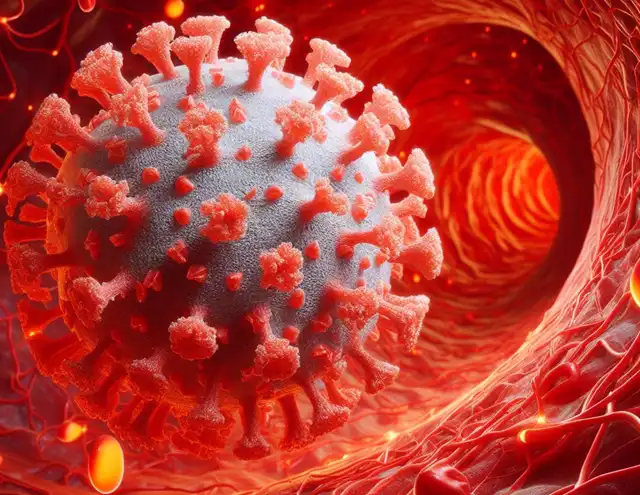Blood Protein ‘Characteristics’ Identified as Key to Long-COVID Diagnosis and Treatment
- Normal Liver Cells Found to Promote Cancer Metastasis to the Liver
- Nearly 80% Complete Remission: Breakthrough in ADC Anti-Tumor Treatment
- Vaccination Against Common Diseases May Prevent Dementia!
- New Alzheimer’s Disease (AD) Diagnosis and Staging Criteria
- Breakthrough in Alzheimer’s Disease: New Nasal Spray Halts Cognitive Decline by Targeting Toxic Protein
- Can the Tap Water at the Paris Olympics be Drunk Directly?
Blood Protein ‘Characteristics’ Identified as Key to Long-COVID Diagnosis and Treatment
- Should China be held legally responsible for the US’s $18 trillion COVID losses?
- CT Radiation Exposure Linked to Blood Cancer in Children and Adolescents
- FDA has mandated a top-level black box warning for all marketed CAR-T therapies
- Can people with high blood pressure eat peanuts?
- What is the difference between dopamine and dobutamine?
- How long can the patient live after heart stent surgery?
Blood Protein ‘Characteristics’ Identified as Key to Long-COVID Diagnosis and Treatment
Researchers have examined proteins in the complement system (an essential component of the immune system) of Long-COVID patients and identified a “characteristic” blood protein that could enhance diagnosis and lead to treatments for this debilitating condition.
Approximately 5% of SARS-CoV-2-infected individuals fail to recover from acute illness and instead develop long-term symptoms that cause fatigue, commonly referred to as “Long-COVID.”
While the exact cause remains unclear, current hypotheses include tissue damage, viral reservoirs, autoimmune reactions, and persistent inflammation. There are currently no diagnostic tests or treatment plans specifically for this condition.
Researchers from the University of Zurich and Zurich University Hospital utilized proteomics (the large-scale study of proteins) to discover a pattern in the blood proteins of Long-COVID patients and their impact on the complement system, a part of the innate immune system composed of various proteins in the blood plasma and on cell surfaces.
These proteins interact to enhance antibody function, clear microbes and damaged cells, promote inflammation, and bolster the body’s ability to combat pathogens.
A year-long follow-up study involving 113 COVID-19 patients, of whom 33% experienced severe symptoms, revealed that 40 individuals still had lingering symptoms six months later. In the 12-month follow-up, 22 of these Long-COVID patients reported persistent symptoms, while 10 had recovered (with 8 lost to follow-up).
To identify biomarkers for Long-COVID, researchers collected serum samples from healthy controls and COVID-19 patients during acute infection and at the 6-month follow-up. They used two high-throughput proteomic methods to measure 6596 different serum proteins. Differences were observed in serum protein levels between severe and mild acute COVID-19 patients, as well as between Long-COVID and non-Long-COVID patients, both during the acute infection and the 6-month follow-up.
Analysis of the protein changes in Long-COVID confirmed overactive complement system activity, according to Carlo Cervia-Hasler, the study’s lead author. “Blood levels in active Long-COVID patients also increased, indicating damage to various cell types, including red blood cells, platelets, and blood vessels.”
Researchers noted that the changes observed in Long-COVID patients suggested interactions between complement proteins, which play a role in blood clotting, tissue damage, and inflammation repair. The study observed that blood levels in Long-COVID patients returned to normal within six months, indicating that the observed serum protein pattern is characteristic of active Long-COVID.
Onur Boyman, the senior author of the study, stated, “In Long-COVID patients, the complement system does not return to baseline but remains in an activated state, potentially damaging healthy cells.”
The findings of this study have generated significant interest in the medical community.
Jeremy Nicholson, Professor of Medicine at Murdoch University in Western Australia and Director of the Australian National Phenome Center, commented, “This paper helps identify some fundamental immunological disturbances, helping us understand thrombotic inflammatory effects—such as affecting the vascular endothelium—that could lead to more widespread systemic issues (all organs have blood vessels). The paper sheds new light on complement protein disturbances, but it still cannot explain the diversity of long-term symptoms of COVID or differential expression among individuals. In fact, this work revolves around protein data from a relatively small number of patients, so it is unlikely to explain everything on its own.”
As the biomarkers identified by researchers are specific to Long-COVID patients, providing accurate diagnosis six months after symptoms appear and unaffected by any COVID-19 history information, they suggest that these biomarkers have clinical applicability. Existing therapies targeting the complement pathway affected by Long-COVID could offer new treatment strategies for the condition.
The study is published in the journal “Science.”

Blood Protein ‘Characteristics’ Identified as Key to Long-COVID Diagnosis and Treatment
(source:internet, reference only)
Disclaimer of medicaltrend.org
Important Note: The information provided is for informational purposes only and should not be considered as medical advice.



